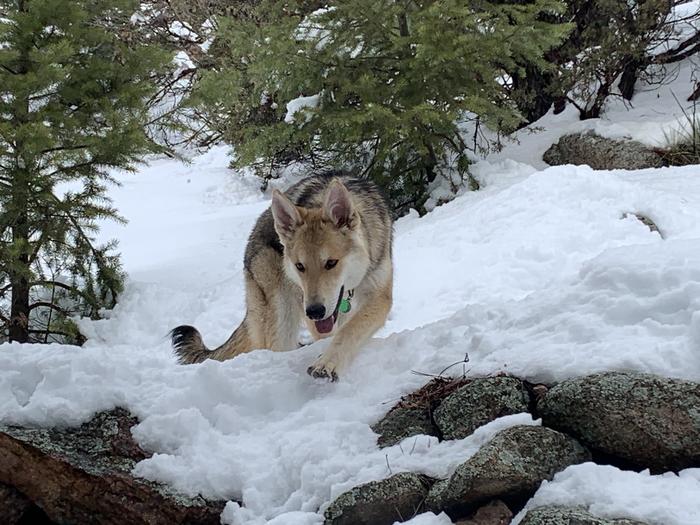BEND, Ore. – Gut microbes found in wild wolves may be the key to alleviating a debilitating gastrointestinal condition common to domestic dogs, according to a study led by researchers at Oregon State University – Cascades.

Credit: Pam Lundeberg
BEND, Ore. – Gut microbes found in wild wolves may be the key to alleviating a debilitating gastrointestinal condition common to domestic dogs, according to a study led by researchers at Oregon State University – Cascades.
In a paper published in Applied Microbiology, the authors report a novel strain of Paenibacillus bacteria with characteristics of a probiotic – an organism that conveys a health benefit to the host.
In this case, the benefit would be to head off canine inflammatory bowel disease, a chronic illness characterized by vomiting, reduced appetite, weight loss, flatulence, a rumbling stomach and/or abdominal discomfort, said Bruce Seal of OSU-Cascades’ biology program.
“At present there is no known cure for this ongoing dysbiosis of the gastrointestinal tract, and there are limited options for treatment,” Seal said. “Underlying causes of the condition include an animal’s genetics, environmental factors, the immunological state of the GI tract and, maybe most importantly, an altered gut microbiome.”
The research, a collaboration between scientists at OSU-Cascades and Oregon State’s Carlson College of Veterinary Medicine, is an important step toward a dietary supplement or food additive capable of steering the composition of a dog’s gut microbiome back toward that of the wolf, with which it has common ancestry.
“Dogs were the first domesticated animal,” Seal said. “The modern dog diet, high in carbohydrates, does not reflect a wolf’s diet – for example, starches in processed dog food are resistant to digestion, and that can have a negative impact on the microbial community in a dog’s GI tract and in turn its gastric physiology.”
In this study, gastrointestinal material was collected from a dead wolf one day after it died from injuries sustained from being struck by a car. The scientists isolated 20 different gut bacteria that preliminary genetic analyses indicate have probiotic qualities, and for this paper they performed whole genome sequencing on a novel Paenibacillus strain.
The bacterium encodes enzymes that can digest complex carbohydrates such as starches, Seal said. It also has gene systems expressing antimicrobials.
“Non-toxic, spore-forming bacteria promote anti-inflammatory immune responses in the gut and inhibit pathogen growth,” he said. “Taking everything into account, this bacterial isolate could be a potential useful probiotic for domestic dogs.”
Seal added that the researchers plan to perform whole genome sequencing on four or five other bacterial species among the 20 isolates.
Seal and OSU-Cascades colleagues Pat Ball, Evan Forsythe and Kristina Smith co-led the study along with former colleague Heather Broughton. The team also included OSU-Cascades students Jennifer McCabe, Jessika Bryant, C. Cristoph Klews, MiCayla Johnson, Ariel Atchley, Thomas Cousins, Analiska Dominguez, Marie Gabriel, Katie Middleton and Natasha Bowles. Several students were supported by the OSU Undergraduate Research, Scholarship and the Arts program and the OSU-Cascades Layman Fellowship program.
Mark Ackermann and Robert Bildfell also contributed to the research while with the Carlson College of Veterinary Medicine’s Oregon Veterinary Diagnostic Laboratory in Corvallis. Bildfell has retired, and Ackermann is now the director of the USDA Agricultural Research Service’s National Animal Disease Center in Ames, Iowa.
Journal
Applied Microbiology
DOI
10.3390/applmicrobiol3040077
Method of Research
Observational study
Subject of Research
Cells
Article Title
Phenotypic and Draft Genome Sequence Analyses of a Paenibacillus sp. Isolated from the Gastrointestinal Tract of a North American Gray Wolf (Canis lupus)
Article Publication Date
23-Sep-2023
COI Statement
The authors declare no conflict of interest. The funders had no role in the design of the study; in the collection, analyses, or interpretation of data; in the writing of the manuscript; or in the decision to publish the results.




